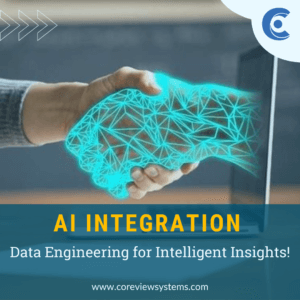AI Integration: Data Engineering for Intelligent Insights

In today’s data-driven world, organizations are constantly seeking ways to extract meaningful insights from their vast troves of data. Artificial intelligence (AI) has emerged as a game-changer in this arena, empowering data engineers to transform raw data into actionable intelligence. By integrating AI into data engineering processes, organizations can unlock a new level of efficiency, automation, and predictive capabilities.
AI-Powered Data Engineering: A New Paradigm
AI integration in data engineering encompasses various aspects of data management, including:
-
Data Collection and Ingestion: AI algorithms can automate the identification and extraction of relevant data from diverse sources, ensuring that data pipelines are continuously fed with fresh, high-quality data.
-
Data Cleaning and Preprocessing: AI techniques can efficiently clean and prepare data for analysis, eliminating errors, inconsistencies, and irrelevant information. This improves the quality and reliability of data, leading to more accurate insights.
-
Data Transformation and Enrichment: AI algorithms can transform raw data into a format suitable for analysis, enriching it with additional insights and context. This enriched data provides a more comprehensive understanding of business operations and customer behavior.
-
Real-Time Data Analytics and Insights Generation: AI-powered analytics enable real-time monitoring of data, allowing organizations to identify patterns, trends, and anomalies as they occur. This real-time visibility empowers organizations to make timely, informed decisions that optimize business outcomes.
The Benefits of AI-Driven Data Engineering
The integration of AI into data engineering brings a multitude of benefits:
-
Enhanced Efficiency and Automation: AI automates many repetitive and time-consuming tasks, such as data cleaning and transformation, freeing up data engineers to focus on more strategic initiatives.
-
Improved Data Quality and Reliability: AI algorithms can identify and remove errors, inconsistencies, and irrelevant data, ensuring that analysis is based on high-quality, reliable information.
-
Deeper Insights and Predictive Modeling: AI enables organizations to extract deeper insights from their data, uncovering hidden patterns and trends that would otherwise remain hidden. This data-driven decision-making leads to improved business outcomes.
-
Real-Time Monitoring and Anomaly Detection: AI-powered analytics enable real-time monitoring of data, allowing organizations to identify potential issues, such as fraud or system failures, before they cause significant disruptions.
Embrace the AI-Powered Data Engineering Revolution
AI integration in data engineering is not just a future trend; it is a reality that is transforming the way organizations manage and analyze their data. By embracing AI-powered data engineering, organizations can unlock a new level of efficiency, insights, and competitive advantage.
Are you ready to harness the power of AI to transform your data engineering practices?
